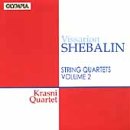| All Artists: Shebalin, Krasni Qt Title: Shebalin: String Quartets, Vol. 2 Members Wishing: 0 Total Copies: 0 Label: Olympia Original Release Date: 1/1/1940 Re-Release Date: 10/24/2000 Genre: Classical Styles: Chamber Music, Historical Periods, Classical (c.1770-1830) Number of Discs: 1 SwapaCD Credits: 1 UPC: 515524406646 |
Search - Shebalin, Krasni Qt :: Shebalin: String Quartets, Vol. 2
 | Shebalin, Krasni Qt Shebalin: String Quartets, Vol. 2 Genre: Classical
|
Larger Image |
CD Details |
CD ReviewsAn Enterprising follow-up of Shebalin's String Quartets. David A. Hollingsworth | Washington, DC USA | 01/06/2001 (5 out of 5 stars) "The youthful Krasni Quartet continues will it's priceless survey of Shebalin's String Quartets in the Second Volume recorded by Olympia. If you like the first Volume of the String Quartets admirably played by this promising ensemble, then there's plenty to enjoy in this second installment.Shebalin's Quartets in the First volume, namely the First, Second, and Third, shows Shebalin's at his individuality. Even at the heights of Stalinism, Shebalin's quartets are formalist in every way, not sacrificing artistic principles and not paying lip service to the ideals of Socialist Realism. Indeed, he learned well from Nikolai Myaskovsky, his professor of composition of the Moscow Conservatory. He also learned well from Dmitri Shostakovich, the composer who accepted Socialist Realism, but on his own terms, & whose influence can be felt most especially in Shabalin's earlier quartets (in the manner of style and mannerism, not really in the manner of thought).So. What to make of the the Second Volume containing the Fourth, Fifth, and Ninth String Quartets? Not really a difficult question. His musical fingerprints and integrity remain firmly intact (at least for the most part) and Shebalin's faithfulness in Russian traditionalism was all but dismissable here. This is evident in his most popular of the quartets: the Fifth Quartet (1942) "Slavonic", where the use of folksongs was rather heavy and probably a response to the Great Patriotic War (World War II). The Quartet also borrowed themes from Tchaikovsky. The allegro section following a somber, moderato beginning reminiscene closely Tchaikovsky's Serenade for Strings while the Andante third movement uses the Serbian Song Tchaikovsky used for March Slav. Though Shebalin was less idiomatic & individualistic in the "Slavonic" quartet as compared to, say, his Second or Third, it would not be feasible to call it socialist realist piece, especially since the enforcement of the ideals was fully relaxed during the war years. There's a sense of development and organic growth in this Quartet and Shebalin aimed to remind the Soviet people the beauty and glory of Russian culture, not necessarily to applease the officials. What's common about the quartets, even the Fifth, is that they inhibit the Myaskovskian sense of introspection and inwardness, especially the Fourth (1940). Even the Vivo Third movement (alla marcia) is hardly a lively march in the truest sense while the andante-allegro has an end result that's contemplative in outlook. The Ninth (1963), composed in a more promissive, post-Stalinist period, shows hints of atonal music. Although the Andante second movement is reflective, even in a manner of Myaskovsky, the outer movements returns to the world of post modernism Shebalin was very much a part of in the early 1930s (his Third Symphony & the Second String Quartet composed in that period come to mind). The Krasni Quartet is becoming a more impressive of an ensemble, performing every note with a euphonious sense of confidence, preparation, and admirations towards the music and even towards the composer. The music making is simply flawless and faithful to the scores, not underpinning the substance of the works nor exaggerating them. The recording is clean and faithful while Per Skans continues to be an authoritative expert on Soviet music, as made obvious by his excellent booklet essay. I eagerly await the next installment & perhaps the chamber works of the Russian avant gardes (Knipper, Roslavets, Mosolov, et al.), Vainberg, or even Gliere and Lyatoshynsky would be of interests to this ever so growing group. Shebalin's works on this disc (and others) are appealing due to the substance, craftmanship, and integrity in musical thoughts they demonstrate. Though many bars are not necessarily memorable (or even loveable), acquiring Shebalin's works is essential if we are to get a more rounded picture of Soviet musical life, and the conflict between adhering the Socialist Realism and adhering the essence of musical art. Shebalin, for the most part, adhered to the latter, though with a price."
|

 Track Listings (12) - Disc #1
Track Listings (12) - Disc #1